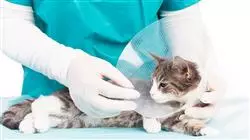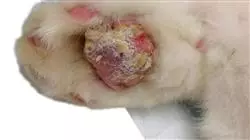University certificate
The world's largest faculty of veterinary medicine”
Why study at TECH?
This Postgraduate diploma contains all the scientific theory and clinical practice necessary to bring you up to date in Feline Oncology, Neurology and Dermatology"

Generally, feline neurology presents a number of difficulties that can be frustrating for the specialist. Most signs are often nonspecific, creating a need to master both complex and basic diagnostic procedures. In the case of nephrology this occurs in a similar way, with symptoms that are difficult to detect and treatments that require multimodal management for a successful approach. It is logical to think, therefore, that it is useful to be up to date in both fields in order to have a better global vision of the most delicate pathologies and symptomatologies in the feline patient.
In addition, feline dermatology can sometimes serve as an indicator for the specialist for an early diagnosis of multiple pathologies. United in a single program, all these disciplines make up a preferred option for all veterinary specialists, since their updating will be a decisive and differential step towards a complete and careful professional praxis.
In addition, TECH is aware of the difficulties that a veterinarian may have in undertaking an academic program of these characteristics, which is why it is offered in a completely online format. This makes it possible to combine the academic facet of the Postgraduate diploma with professional activity or more demanding personal responsibilities.
You will have the technical support of the largest online academic institution in the world, TECH, solving all your doubts and concerns throughout the program"
This Postgraduate diploma in Feline Oncology, Neurology and Dermatology contains the most complete and up-to-date scientific program on the market. The most important features include:
- The development of case studies presented by experts in Feline Medicine and Surgery
- The graphic, schematic, and practical contents with which they are created, provide scientific and practical information on the disciplines that are essential for professional practice
- Practical exercises where the self assessment process can be carried out to improve learning
- Its special emphasis on innovative methodologies
- Theoretical lessons, questions for experts and individual reflection work
- Content that is accessible from any fixed or portable device with an Internet connection
Incorporate into your daily practice the most recent developments in cutaneous anatomopathology, neurological surgical procedures and electrochemotherapy in felines"
The program’s teaching staff includes professionals from sector who contribute their work experience to this training program, as well as renowned specialists from leading societies and prestigious universities.
The multimedia content, developed with the latest educational technology, will provide the professional with situated and contextual learning, i.e., a simulated environment that will provide immersive education programmed to learn in real situations.
This program is designed around Problem-Based Learning, whereby the professional must try to solve the different professional practice situations that arise throughout the program. For this purpose, the student will be assisted by an innovative interactive video system created by renowned and experienced experts.
You will achieve a more updated mastery of oncological, neurological and feline dermatological approach techniques"

You will be able to choose where, when and how to study, as there are no fixed schedules or pre-set classes"
Syllabus
TECH uses the Relearning pedagogical methodology to alleviate the teaching load of all its programs.
This implies that the most important concepts related to Feline Oncology, Neurology and Dermatology are naturally reiterated throughout the entire syllabus. Thus, the veterinarian assimilates this theory in a much more progressive and efficient way, avoiding having to invest enormous amounts of study hours in such work.

Actual case studies, supplemental readings, interactive summaries, in depth videos and self awareness tests will be key throughout the refresher process”
Module 1. Neurology in Feline Patients
1.1. Neuroanatomy
1.1.1. Embryonic Development of the Nervous System
1.1.2. Parts of the Nervous System
1.1.3. NMS/NMI
1.2. Neurological Examination in the Cat
1.2.1. Necessary Material for a Correct Neurological Examination
1.2.2. Anamnesis and Clinical History
1.2.3. Mental Status, Posture and Gait
1.2.4. Cranial Nerves
1.2.5. Postural Reactions
1.2.6. Spinal Reflexes
1.2.7. Nociception
1.3. Neurolocalization
1.3.1. Clinical Signs Associated with Thalamo-cortical Lesions
1.3.2. Clinical Signs Associated with lesions in the Brainstem
1.3.3. Clinical Signs Associated with Cerebellar Lesions
1.3.4. Clinical Signs Associated with Spinal Cord Injuries
1.3.5. Clinical Signs Associated with PNS Lesions
1.4. Differential Diagnosis and Complementary Tests
1.4.1. Vitamin D
1.4.1.1. Laboratory Diagnosis
1.4.1.2. Radiography
1.4.1.3. Myelography
1.4.1.4. TC/ Magnetic Resonance
1.4.1.5. Electrophysiology
1.4.1.6. CSF Extraction and Study
1.5. Epileptiform Seizures
1.5.1. Diagnostic Protocol
1.5.2. Idiopathic Epilepsy
1.5.3. Treatment
1.6. Feline Vestibular Disease
1.6.1. Vestibular System Anatomy
1.6.2. Acute Vestibular Syndrome
1.6.3. Central Vestibular Syndrome
1.6.4. Bilateral Vestibular Syndrome
1.7. Spinal cord Diseases
1.7.1. Inflammatory/ Infectious Myelopathy
1.7.2. Vascular Myelopathies
1.7.3. Metabolic Myelopathies
1.7.4. Neoplasms
1.8. Metabolic Myelopathies in Cats
1.8.1. Infectious/Inflammatory Encephalopathies
1.8.2. Metabolic Encephalopathy
1.8.3. Neoplasms
1.9. Neurological Emergencies
1.9.1. Cranioencephalic Trauma
1.9.2. Spinal Cord Trauma
1.9.3. Status Epilepticus
1.9.4. Neurotoxicants
1.10. Surgical Procedures
1.10.1. Anesthesia and Analgesia in Neurological Patients
1.10.2. Neurosurgery
1.10.3. Spinal Surgery
1.10.4. Intracranial Surgery
Module 2. Dermatology in the Feline Species
2.1. Feline Dermatology
2.1.1. Structure and Function of the Skin
2.1.2. Dermatological Consultation
2.1.3. Diagnostic Techniques
2.1.4. Primary and Secondary Injuries
2.1.5. Dermatological Patterns
2.2. Dermatologic Patterns and Differential Diagnosis
2.2.1. Dermatologic Patterns and Differential Diagnosis
2.2.2. Pruritus
2.2.3. Focal-Multifocal Alopecia
2.2.4. Symmetrical Alopecia
2.2.5. Papules, Pustules and Scabs
2.2.6. Erosive-Ulcerative Dermatoses
2.2.7. Nodules and Fistulas
2.2.8. Desquamative and Comedogenic Dermatoses
2.2.9. Disorders of Coloration and Pigmentation
2.3. Parasitosis
2.3.1. Arthropods
2.3.2. Ticks
2.3.3. Mites
2.3.3.1. Trombicula
2.3.3.2. Otodectes
2.3.3.3. Cheyletiellosis
2.3.3.4. Demodicosis
2.3.3.5. Notoedres
2.3.4. Insects
2.3.4.1. Lice
2.3.4.1.1. Fleas, DAPP
2.3.4.1.1.1. Dermatitis Associated with Mosquito Bites
2.3.5. Myiasis
2.4. Cytology and Cutaneous Anatomopathology
2.4.1. Procedures for Specimen Collection and Submission
2.4.2. Normal skin Cytology Findings
2.4.3. Abnormal findings in Inflammatory Cytologies
2.4.4. Cytologic Patterns of Inflammation
2.4.5. Infectious Agents
2.4.6. Skin Histopathologic Patterns
2.5. Hypersensitivity Disorders
2.5.1. Hypersensitivity Disorders
2.5.2. Feline Atopic Dermatitis
2.5.3. Adverse Reactions to Food/Food Allergy
2.6. Dermatophytosis, Malassezia Dermatitis and Other Mycoses
2.6.1. Clinical Signs
2.6.2. Diagnosis
2.6.3. Treatment
2.6.4. Environmental Control
2.6.5. Public Health Aspects
2.6.6. Malassezia Dermatitis
2.6.6.1. Clinical Signs
2.6.6.2. Treatment
2.6.7. Other Mycosis
2.7. Bacterial Infections
2.7.1. Superficial Bacterial Folliculitis or Pyoderma
2.7.2. Deep Pyoderma
2.7.3. Abscesses
2.7.4. Feline Leprosy
2.8. Autoimmune Diseases, Nose and Nails
2.8.1. Autoimmune Diseases
2.8.2. Nose Diseases
2.8.3. Nail Diseases
2.9. Feline Eosinophilic Complex
2.9.1. Clinical Signs
2.9.2. Diagnosis
2.9.3. Treatment
2.10. Hormonal, Dermatological, Cutaneous Psychogenic Diseases, Feline Acne
2.10.1. Feline Acne
2.10.2. Hormonal Diseases
2.10.3. Dermatological Diseases with Oral Involvement
2.10.4. Cutaneous Psychogenic Diseases
Module 3. Oncology in the Feline Patient
3.1. Approach to the Feline Patient with a Mass
3.1.1. First Evaluation
3.1.2. Cytology: Methods of Collection, Preparation, Staining and Dispatch
3.1.3. Choosing the Type of Biopsy
3.1.4. Peculiarities of Biopsy Collection According to Specific Locations
3.1.5. Staging
3.2. Particularities of Chemotherapy in Cats
3.2.1. Usage Scenarios
3.2.2. Preparation
3.2.3. Administration
3.2.4. Adverse Effects of the Chemotherapy and its Management
3.3. Drugs and Electrochemotherapy
3.3.1. Alkylating Agents
3.3.2. Anthracyclines
3.3.3. Antimetabolites
3.3.4. Antitubulin Agents
3.3.5. Platinum-Derived Drugs
3.3.6. Tyrosine Kinase Inhibitors
3.3.7. Other Drugs
3.3.8. Electrochemotherapy
3.4. Digestive Lymphoma
3.4.1. Types
3.4.2. Clinical Signs
3.4.3. Diagnosis and Staging
3.4.4. Treatment and Prognosis
3.5. Other Types of Lymphoma
3.5.1. Peripheral Lymph Node Lymphoma
3.5.2. Mediastinal Lymphoma
3.5.3. Nasal Lymphoma
3.5.4. Renal Lymphoma
3.5.5. Central Nervous System Lymphoma
3.5.6. Uterine and Subcutaneous Lymphoma
3.5.7. Pharyngeal, Laryngeal and Tracheal Lymphoma
3.5.8. Ocular Lymphoma
3.6. Breast Tumors
3.6.1. Clinical Presentation
3.6.2. Diagnosis
3.6.3. Treatment
3.6.4. Prognosis
3.7. Injection Site-Associated Sarcoma
3.7.1. Pathogenesis.
3.7.2. Epidemiology
3.7.3. Clinical Management
3.7.4. Treatment
3.7.5. Prevention
3.8. Other Frequent Types of Tumors in the Feline Species
3.8.1. Squamous Cell Carcinoma
3.8.2. Respiratory Carcinoma (Nasal and Pulmonary)
3.8.3. Mastocytoma
3.8.4. Squamous Cell Oral Carcinoma
3.8.5. Osteosarcoma
3.9. Oncologic Surgery: Excision Margins
3.9.1. Tumor Margins
3.9.2. Types of Resection
3.9.3. Assessment of Margins
3.9.4. Communication with the Pathologist
3.9.5. Interpretation of Margins in the Biopsy Report
3.10. Pain Management in the Cat with Cancer
3.10.1. Pain Management in the Cat with Cancer
3.10.2. Evaluation
3.10.3. Treatment

You will be free to download the entire syllabus from the first day of your degree”
Postgraduate Certificate in Feline Oncology, Neurology and Dermatology
Feline ontology, neurology and dermatology are important areas of study in veterinary medicine that focus on specific aspects of medical care for cats.
Feline ontology.
Ontology is the study of the nature of existence and reality. In the context of veterinary medicine, ontology refers to understanding the biological and physiological processes that occur in the body of cats in their normal state of being. To develop feline ontology, a thorough knowledge of cat anatomy and physiology is required.
This academic program includes the study of the cat's body systems, such as the cardiovascular, respiratory, digestive, nervous and endocrine systems. This allows veterinary medical professionals to understand how cats' bodies function under optimal health conditions.
Feline Neurology.
Neurology is the branch of medicine that focuses on the study of the nervous system and its disorders. Feline neurology focuses specifically on neurological disorders affecting cats. To develop feline neurology, a thorough understanding of the anatomy and physiology of the nervous system of cats is required.
Developing skills in feline neurology include neuroanatomy and animal neurophysiology. Here you study the different neural systems, and the complexity of the brain and spinal cord of cats. With a thorough understanding of the physiology and anatomy, different neurological disorders in cats can be diagnosed and treated.
Feline dermatology.
Feline dermatology is the branch of veterinary medicine that focuses on diseases of the skin, hair, and claws of cats. Scholars can develop feline dermatology by taking specific courses in animal dermatology, which include the study of normal cat skin physiology, skin diseases, diagnostic tests, and recommended treatments.
Understand the peculiarities of cat skin as a function of breed. It is also important to learn about the different skin pathogens and proper patient management in feline dermatology practices.
The academic program in these areas includes the study of body systems, anatomy and physiology of the nervous system, and skin diseases of cats.







